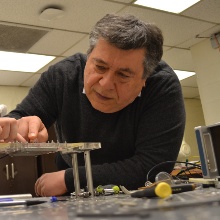Alexander Vakakis originally wanted to start his research stay at the University of Stuttgart in April 2020, but the corona pandemic turned his plans upside down. By September though, the time had come. And even then his flight was rerouted to Hamburg, where he had to wait for three days for his coronavirus test result to come back negative, and only then he was allowed to proceed on his way.
Vakakis is a professor at the University of Illinois in Urbana-Champaign, and runs the Linear and Nonlinear Dynamics and Vibrations Laboratory at the Department of Mechanical Science and Engineering together with two of his colleagues. In 2019, the Greek-born scientist was honored with the Humboldt Research Award worth 60,000 euros for his achievements in research during his career, which gave him the opportunity to spend up to a year working together with German researchers at a university of his choice.
An expert in his field
“Professor Vakakis is an absolute expert in the field of non-linear dynamics of mechanical systems, and has developed some key concepts which everybody working in the field relies on”, explains an enthusiastic Malte Krack, whose working group Vakakis is currently working in. The junior professor at the Institute of Aircraft Propulsion Systems nominated Vakakis for the prize along with Professor Jörg Wallaschek at the Leibniz University Hannover.
Our world is not linear
Prof. Alexander Vakakis, Humboldt Research Award winner
Vakakis researches and models non-linear phenomena in vibrations and sound waves. “You can find non-linearities everywhere, for example even in turbulence within liquids or in the friction which would make motion impossible if it didn’t exist”, explains the machine engineer by video link from the University guest house where he is currently living. Even the force which a table needs to exert in order to hold the weight of a bottle isn’t linear, but suddenly shoots up from zero as soon as the bottle touches the table.
Since these kinds of non-linear phenomena are highly complex, they have previously mostly been ignored when designing mechanical systems. Engineers often interpret these phenomena as if they were linear. However, a number of technical applications could be made more robust and more efficient if the non-linear properties which exist were also taken into account. This is why Vakakis’ working group focuses on the so-called “targeted energy transfer”. This relates to how vibrational energy or sound waves can be steered in the desired directions and absorbed by exploiting non-linear interactions.
Protection against material damage on aircraft
Scientists for example have already used their findings to design vibration dampers for aircraft or buildings which can offer even better protection against material damage caused as a result of vibrations, tremors or explosions. Alexander Vakakis also carries out research into new types of metamaterials which don’t exist in nature, and which should for example be able to mitigate the effects of noise, vibrations and shocks.
Energy generation for intelligent systems
On the other hand, natural vibrations from the surroundings can also be used systematically, such as for example to provide sensors or actuators with energy for condition monitoring. This form of energy generation is of interest for intelligent systems which can automatically react to changes in environmental conditions. In one project with Krack for example, Vakakis uses his expertise in non-linearities in order to increase the energy yield of a system of this kind. “It’s a very interesting synergy”, says Krack, “while Vakakis carries out basic research, we’re building bridges to application-based research and working more closely with industry”.
Synergy between basic research and application-based research
“Among other things, the Humboldt Award is a fantastic opportunity to reinforce my long-lasting and successful collaboration with Professor Krack”, explains Vakakis. Krack previously spent a year carrying out research in Vakakis’ laboratory in 2015 after finishing his doctoral degree studies. “I know the quality and the depth of his work”, praises Vakakis. He went on to say that because of this, it was an obvious choice to spend part of his research stay at the University of Stuttgart. And even though this is his first visit to Stuttgart, Vakakis explains that because of the previous collaboration he was able to get started working with the team straight away.
Other visits in the pipeline
Vakakis has a very busy schedule. Twice a week he gives an online lecture for doctoral students at the universities of Stuttgart and Hanover. He is involved in three research projects with Krack, with more joint projects in the planning stage. Because of the time difference, his evenings are taken up with his work with colleagues at the University of Illinois. “Free time? “What’s that?”, jokes Vakakis. He likes to briefly get away from his work with long walks around the Vaihingen Campus, which he finds very “pedestrian-friendly”, or with a visit to one of Stuttgart’s museums. “In any case, I plan to visit the University of Stuttgart a second time or maybe even a third time in the coming year, no matter what happens with the corona pandemic”, says Vakakis, who will soon be returning home.


